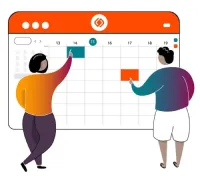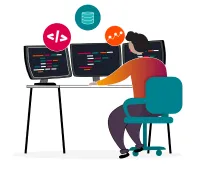Land your dream job in tech!
Over 4,000 BloomTech grads since 2017
- Part-time and full-time options
- $0 tuition payments upfront
Start your FREE Trial today! Terms apply to tuition options
Over 4,000 BloomTech grads since 2017
Start your FREE Trial today! Terms apply to tuition options
We help learners of all backgrounds launch tech careers. We can do the same for you.
For placed 2022 graduates
Since 2017
You have options. So why choose BloomTech? We offer the most flexible and fully supported tech training programs in the industry.

Customize your learning schedule with live and recorded classes.
Start any time and
graduate in 4-18 months.

Get academic and career support from Day 1 until you land a job. We'll help you apply for jobs + prep for interviews.

Test drive BloomTech + start learning today—for free! Write code with experts live, get coaching + support, and build cool projects.
Learn the fundamentals of frontend, backend, servers, databases, APIs, and more.
You can also be a(n)
Get in-depth training for a career in data analysis, artificial intelligence, and predictive modeling.
You can also be a(n)
Learn the skills necessary to land in-demand backend engineering roles at companies of all sizes.
You can also be a(n)
Some of BloomTech’s 4,000 successful graduates share how our training and
career support led to a better career and higher income.
We'll help you get hired. Our team works with you throughout the program and after graduation to help you polish your portfolio, practice interviewing, and land your dream job.
Answer a few quick questions and we’ll reach out to you with more information.
Try us risk-free for 3 weeks and see for yourself! No deposit or payments necessary.
Interested in a career in tech but not sure which course fits you best?
Take our quiz.

BloomTech has helped over 4K+ alumni land a career in tech. 90% of our 2021 job-seeking graduates landed jobs with a median salary increase of $27,500.

Learners progress through the material at their own pace, moving on in the program by demonstrating competency in each sprint. Depending on your program and your schedule, our bootcamps range from 6-12 months.

Total costs range from $17,950 for upfront tuition to $19,000+ for Deferred Tuition. With Deferred tuition, we don’t require any upfront payments. With both options, you’ll owe nothing if you don’t get a job within a year of graduation (terms apply). Discover all the available tuition choices here!
Start your Free Trial and kickstart your tech career with BloomTech.
Have a question? Schedule a call with an Admissions Representative.